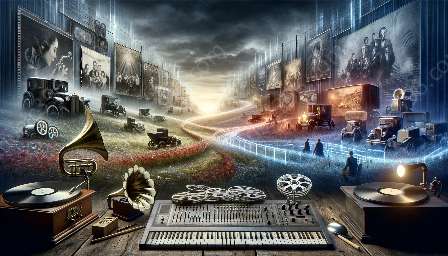When it comes to the psychological impact of movie soundtracks, there is a profound influence on individuals' physiological responses. Soundtracks not only enhance the viewing experience but also have the power to evoke emotional and physical reactions. In this article, we will delve into the fascinating world of how movie soundtracks influence individuals' physiological responses and explore the psychological impact of these sonic compositions.
Understanding the Psychological Impact of Movie Soundtracks
Movie soundtracks play a pivotal role in shaping the audience's emotional engagement with a film. Whether it's a heart-pounding action sequence or a tender romantic moment, the music sets the tone and intensifies the viewer's experience. Psychologically, soundtracks can trigger a range of responses, from heightened arousal to deep relaxation, depending on the mood and tempo of the music.
The human brain's response to music is complex and multifaceted. Research has shown that certain soundtracks can elicit strong emotional reactions, causing the release of neurotransmitters such as dopamine and serotonin. These neurotransmitters are associated with feelings of pleasure, happiness, and well-being, demonstrating the profound impact that music can have on our psychological state.
The Influence on Physiological Responses
Soundtracks have the ability to directly influence individuals' physiological responses, leading to changes in heart rate, respiration, and other bodily functions. For example, a suspenseful score can elevate heart rate and increase tension, while a soothing melody can induce relaxation and lower stress levels. The synchronization of music with on-screen events can further amplify these effects, creating a powerful emotional and physiological impact on the audience.
Furthermore, soundtracks can modulate individuals' breathing patterns, with rhythmic and melodic elements influencing the pace and depth of respiration. This interplay between music and physiological responses underscores the profound connection between soundtracks and the human body's inherent rhythm and harmony.
The Emotional Resonance of Soundtracks
Soundtracks possess a remarkable ability to evoke strong emotions and trigger memories. Certain musical motifs or themes can become deeply intertwined with specific scenes or characters, eliciting a nostalgic or poignant response from the audience. This emotional resonance is a testament to the enduring power of soundtracks in shaping our perceptions and experiences of the cinematic world.
Additionally, the use of leitmotifs, recurring musical themes associated with particular characters or story elements, can profoundly influence the audience's emotional and physiological responses. By associating specific melodies with characters or narrative arcs, soundtracks can evoke a sense of familiarity and emotional connection, further enriching the viewer's immersion in the cinematic narrative.
The Role of Soundtracks in Evoking Physical Sensations
Soundtracks can elicit a wide array of physical sensations, ranging from goosebumps and chills to heightened sensory awareness. Certain compositions imbue scenes with an ethereal quality, transporting the audience to new and unfamiliar realms. Through the strategic use of instrumentation, tempo, and dynamics, soundtracks have the potential to create an immersive and multisensory experience, captivating viewers on both a psychological and physiological level.
Moreover, the synergistic relationship between sound and imagery can heighten the impact of soundtracks on individuals' physical responses. Visual cues and audio stimuli work in tandem to elicit a holistic sensory experience, further blurring the boundaries between the auditory and visual dimensions of storytelling.
Conclusion
In conclusion, the psychological impact of movie soundtracks is undeniable, with soundtracks exerting a profound influence on individuals' physiological responses. From eliciting emotional resonance to modulating physiological functions, soundtracks play a central role in shaping the viewer's cinematic journey. By understanding the intricate interplay between soundtracks, psychology, and physiology, we gain insight into the captivating power of music to stir our deepest emotions and sensations.





















